With Winter X Games medals in one hand and their snowboards in the other, the Hirano brothers — Ayumu and Kaishu — posed for photograph after photograph at the bottom of the half-pipe.
Get used to it. They could be on the podium again at the Beijing Olympics, and it would be no surprise to see the entire Japanese team go gold, silver, bronze and maybe even scoop up fourth place, too.
“The Japanese are a force,” said Australia’s Scotty James, who took gold at Winter X over the weekend and, along with Shaun White, is among the handful of male riders standing in the way of Japan’s growing dominance.
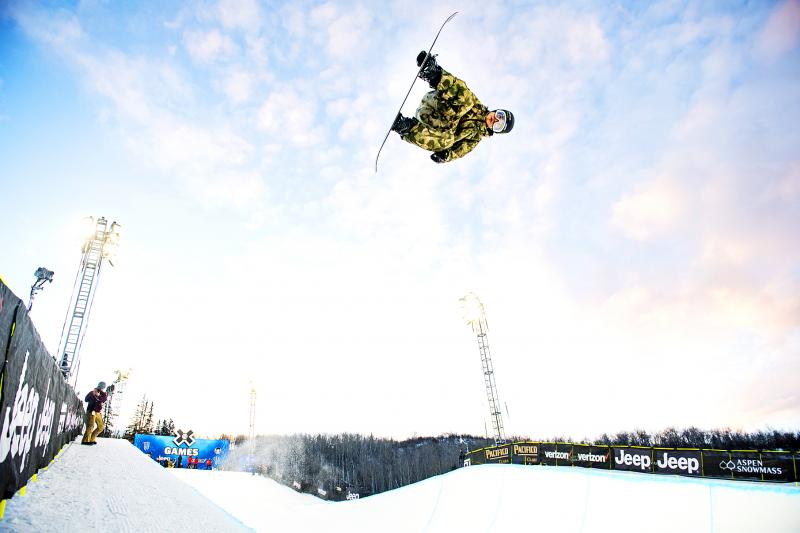
Photo: AP
“Just incredibly talented snowboarders,” James said.
They are tight-knit, too. They might be fierce rivals on competition days, but they stay good friends in between. They travel together, eat together and perfect innovative tricks together. They have certainly raised the bar in the half-pipe, along with expectations.
Long filled with potential, they only have Ayumu Hirano’s two silver medals and Taku Hiraoka’s bronze to show for it since snowboarding arrived on the Olympic scene in 1998.
Yet this crew of Japanese riders appears poised to take over the half-pipe in Beijing with four bona fide gold-medal contenders in the Hirano brothers — Kaishu is nearly four years younger than Ayumu — along with Ruka Hirano and Yuto Totsuka, who is ranked first in the world after dominating the half-pipe for the past two years.
The country’s next-best could be in contention, as well — if there was not a quota limit. It is akin to the days when the US contingent ruled the pipe.
Seven of the world’s top 20 riders hail from Japan. The squad dominates contests and leaves others wondering how to catch up.
“That,” Swiss snowboarder Jan Scherrer said, “is the question we all ask ourselves.”
There are many theories:
‧The riders have a similar style, with a dose of their own flair thrown in, of course.
“They just ooze this natural ability when they ride,” James said. “They’re pushing each other to the highest level.”
‧They pay attention to detail.
“They work so hard and they push each other, so that environment really helps to improve them,” Japanese half-pipe team coach Daisuke Murakami said.
‧They are fearless.
“It always looks like they’re less scared of doing stuff than me, for example,” Scherrer said, laughing.
‧They have air control.
“Their air awareness is fantastic,” James said.
‧Maybe above all, they share tips and constantly support each other.
Take last month at the Dew Tour, when snowboarder Raibu Katayama showed up despite a broken rib and a concussion from a crash a week earlier, not to compete, but to encourage. He stood in the front row of a packed crowd and cheered on his teammates in the half-pipe.
“We’re brothers. We’re a family, but once we get out there for a competition, it’s like a rivalry,” Ruka Hirano said.
Setting the tone and pushing the boundaries is Ayumu Hirano, who is among those attempting to master one of the half-pipe’s most challenging tricks in the triple cork, which consists of three head-over-heels rotations.
The trick could be a game-changer in Beijing and something most riders are scrambling to incorporate. James is working on a version. So are Ayumu Hirano’s teammates. What comes after the triple in a run could be the key to winning the Olympics.
Although Ayumu Hirano has landed it twice in competition this winter, he has struggled with his next trick.
“It’s really hard,” the 23-year-old said using an interpreter. “I want to get [the triple cork] right. That’s my strategy.”
He is business-like, too.
“If you look at Ayumu on a podium, he’s not even smiling,” said Louie Vito, who represented Team USA at the Vancouver Olympics in 2010 and recently earned a spot to Beijing on the Italian team. “They’re not cocky. They don’t showboat. They put on a show for everybody — and that’s what they expect,” Vito said.
The Hirano brothers certainly did at Winter X as Ayumu Hirano entertained the crowd with a triple cork. His little brother stood out, too, in his camouflage outfit.
“It’s not something that happens often, getting on the podium together,” said Ayumu Hirano, who competed at the Tokyo Games last summer in the Olympic debut of skateboarding. “I felt this is what I’d been waiting for.”
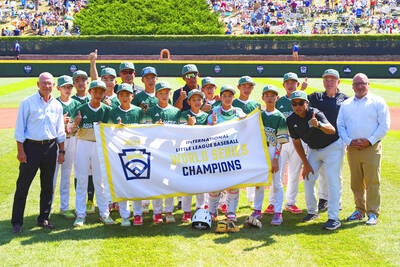
TO THE TOP: After securing the international title on Saturday, Team Taiwan were to face Las Vegas to potentially win their 18th Little League World Series championship A team from Taipei’s Dong Yuan Elementary School won the Little League Baseball World Series’ international title on Saturday by defeating Aruba 1-0 in the annual baseball tournament held in South Williamsport, Pennsylvania. The Taiwan team, competing under the name Chinese Taipei, were after press time last night to face a team from Las Vegas, Nevada, which beat a team from Fairfield, Connecticut, in the US championship 8-2. Taiwan are seeking to win their first Little League Baseball World Series title since 1996. “Really haven’t taken a moment to data dump right now on Taiwan,” Nevada manager T.J. Fescher said. “They’re a
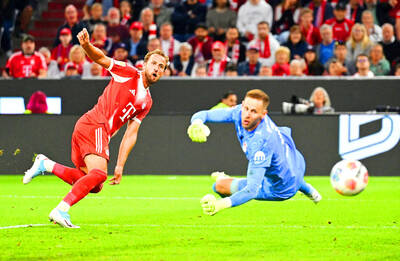
‘CATASTROPHE’: Despite losing several key forwards in the summer transfer window, Bayern were up 3-0 in the first half before Harry Kane scored a hat-trick in the second Harry Kane hit a hat-trick, Michael Olise a double and newcomer Luis Diaz also scored as Bayern Munich made a “statement” against RB Leipzig 6-0 at home in the Bundesliga season opener on Friday. Bayern’s big-money arrivals, all brought in from the Premier League across the past three seasons, were dominant as the Bavarians begun their title defense in style. Olise scored twice in the first half, either side of a Diaz strike. Not to be outdone, Kane scored three goals in the second half — with two assists coming from Diaz, to bring Bayern’s total to 6-0. Kane told the Bundesliga
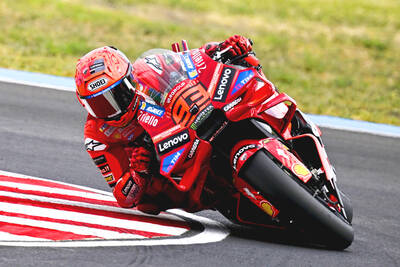
Marc Marquez continued his winning streak as he cruised to victory in the Hungarian GP sprint by two seconds on Saturday night to pad his championship lead. It was a seventh straight Sprint victory for the Spaniard, who has also won the last six longer Sunday grand prix races on his factory Ducati. Fabio Di Giannantonio, an Italian with the VR46 Ducati satellite team was a distant second at Balaton Park, followed by his team-mate and compatriot Franco Morbidelli third. Marquez, a six-time world champion, started the race from pole position. “I felt someone really close on the first corner, from there I
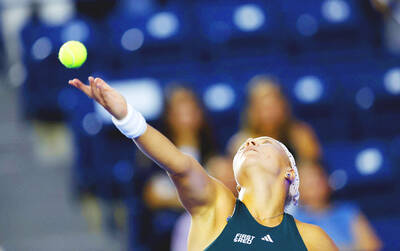
Russian Diana Shnaider continued her impressive winning streak in tour-level finals at the Monterrey Open on Saturday, beating compatriot Ekaterina Alexandrova 6-4, 4-6, 6-4 in the WTA 500 event’s final. Shnaider had little trouble in the opening set but struggled in a topsy-turvy second, as Alexandrova clinched the set’s fifth and decisive break at 5-4 to force a decider. Third-seed Shnaider carved out an advantage early on in the third set when she broke Alexandrova in the first game and held serve to go 2-0 up, an advantage she would not relinquish. World No. 12 Shnaider is now unbeaten in her last five